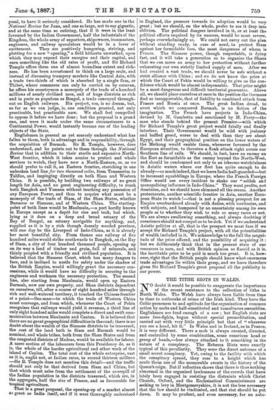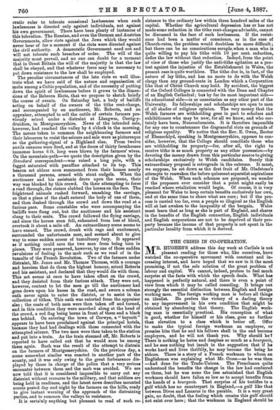THE TITHE RIOTS IN WALES.
NO doubt it would be possible to exaggerate the importance of the recent resistance to the collection of tithe in North Wales. The Welsh have always been liable from time to time to outbreaks of crime of the Irish kind. They have the Celtic proneness to and aptitude for the organisation of common action by mobs and half-constituted and tumultuous assemblies. Englishmen are fond enough of a row ; but English riots are mere free-fights, begun without special premeditation, and carried out with very little principle but that of "wherever you see a head, hit it." In Wales and in Ireland, as in France, it is very different. There a mob is always created, directed, and controlled by some combination, some conscious head or group of heads,—has always attached to it something in the nature of a conspiracy. The Rebecca Riots were exactly typical of this peculiarity. They were the direct outcome of a small secret conspiracy. Yet, owing to the facility with which the conspiracy spread, they rose to a height which has made them one of the memorable events in the history of the Queen's reign. Bat if reflection shows that there is thus nothing abnormal in the organised lawlessness of the crowds that have lately been engaged in resisting the distraints which Christ Church, Oxford, and the Ecclesiastical Commissioners are seeking to levy in Montgomeryshire, it is not the less necessary that the law should be vindicated, and that riot should be put
as great as India itself, and if it were thoroughly understood down. It may be prudent, and even necessary, for an auto- cratic ruler to tolerate occasional lawlessness when such lawlessness is directed only against individuals, not against his own government. There have been plenty of instances of this toleration. The Russian, and even the German and Austrian Governments, allow riots against the Jews which they would never hear of for a moment if the riots were directed against the civil authority. A democratic Government need not and will not tolerate such breaches of order. The will of the majority must prevail, and no one can doubt for a moment that in Great Britain the will of the majority is that the law shall be obeyed, and that whatever force may be necessary to put down resistance to the law shall be employed.
The peculiar circumstances of the late riots so well illus- trate what we have said of the nature and organisation of mobs among a Celtic population, and of the necessity of putting down the spirit of lawlessness before it grows to the dimen- sions of the Rebecca Riots, that we propose to sketch briefly the course of events. On Saturday last, a body of bailiffs acting on behalf of the owners of the tithe rent-charge, and accompanied by an auctioneer, Mr. Roberts, and an appraiser, attempted to sell the cattle of certain farmers pre- Tiously seized under a distraint at Llangwm, Cerrig-y- drnidion, in Montgomeryshire. News of the intended sale, however, had reached the valley by 4 o'clock in the morning. The means taken to summon the neighbouring farmers and their labourers to resist the seizure and sale were as picturesque as the gathering-signal of a Highland clan. From twelve anvils cannons were fired, and at the doors of thirty farmhouses immense horns 6 ft. long were blown by the farmers' wives. On the mountain-path—we quote the description given by the Standard correspondent—was raised a long pole, with a faggot saturated with paraffin attached to its top. This beacon set ablaze soon summoned from their homes nearly a thousand persons, armed with stout cudgels. When the auctioneer and his assistants drove upon the scene, their way was blocked by this crowd. On their attempting to force .a road through, the rioters clubbed the horses on the face. The frightened animals rushed forward, smashing the carriage, so that a piece of the shaft entered the body of one of them, and then dashed through the crowd and down the road at a furious pace. Some constables who were accompanying the bailiffs were flung out, but the auctioneer and his assistant clung to their seats. The crowd followed the flying carriage, and since the horses soon fell, exhausted from loss of blood, overtook it about a mile off. An extraordinary scene seems to have ensued. The crowd, drunk with rage and excitement, surrounded the unfortunate men, and seemed about to give way to some sudden access of tumultuary fury. It appeared as if nothing could save the two men from being torn in pieces. They were preserved, however, by one of those sadden rovulsions of feeling in the mob such as we read of in the tumults of the French Revolution. Two of the farmers under distraint, Mr. Jones and Mr. Thomas Thomas, with a courage and heroism that do them the highest honour, seized Roberts and his assistant, and declared that they would die with them. This act seems at once to have taken effect on the crowd, and they desisted from their furious attack. They were not, however, content to let the men go till the auctioneer had gone down upon his knees in the road, and sworn a solemn oath never again to enter the district, or to assist in the collection of tithes. This oath was extorted from the appraiser also ; the coats of both men were then taken off and turned, and in this condition they were marched along at the head of the crowd, a red flag being borne in front of them and a black one behind. On entering the town of Corwyn, a " boycott" appears to have been proclaimed against the principal hotels, because they had had dealings with those connected with the attempted seizure. The two men were then taken to the station and put into a train. As the train steamed off, Mr. Roberts is reported to have called out that he would soon be among them again. Such was the result of the attempt to distrain on the farmers of Montgomeryshire. On the previous day, a scene somewhat similar was enacted in another part of the eounty, and it was only owing to the great forbearance dis- played by those in charge of the police that a very serious encounter between them and the mob was avoided. We are now told that it is considered impossible to carry out any distraint without recourse to the military, and that soldiers are being held in readiness, and the latest news describes mounted scouts posted day and night by the farmers on the hills, ready to give instant warning of the approach of the distraining parties, and to summon the valleys to resistance.
It is certainly anything but pleasant to read of such re- sistance to the ordinary law within three hundred miles of the capital. Whether the agricultural depression has or has not made some reduction in the tithe rent-charges advisable, cannot be discussed in the face of such lawlessness. If the resist- ance had been a matter of conscience, as in the case of Church-rates, the problem would doubtless be more difficult ; but there can be no conscientious scruple,when a man who is quite willing to pay his tithe with 10 per cent. reduction, defies the law without that reduction. Indeed, from the point of view of those who justify the anti-tithe agitation as a pro- test against the injustice of the Establishment in Wales, the present case is quite worthless. The tithe due is, in fact, of the nature of lay tithe, and has no more to do with the Welsh clergy than any ground-rents in London which a Corporation like that of Christ Church may hold. By accident, the biggest of the Oxford Colleges is connected with the Dean and Chapter of an English Cathedral; bull by far its most important side— its educational side—is as unsectarian as any other part of the University. Its fellowships and scholarships are open to men of all shades of religious opinion. The very money that the Welsh farmers are withholding goes in part to scholars and exhibitioners who may be now, for all we know, and who cer- tainly have been, Nonconformists. It is therefore impossible for any one to countenance the disgraceful riots on grounds of religious equality. We notice that the Rev. E. Owen, Rector of Ebenechlyd, speaking in Montgomeryshire, appears to con- sider, however, that the College should conciliate those who are withholding its property—for, after all, the right to receive tithe is as much property as any other possession—by devoting the money drawn from this particular source to giving scholarships exclusively to Welsh candidates. Surely this extraordinary proposal is retrograde in the extreme. It must, we suppose, be set down as the first fruit of Mr. Gladstone's attempts to reawaken the before quiescent separatist aspirations of the Welsh. When such schemes are proposed, we wonder if the proposers ever consider that a point might easily be reached where retaliation would begin. Of course, it is very pleasant for Wales to keep certain benefits exclusively her own, and at the same time to share what are ours; but if the pro- cess is carried too far, even a people so illogical as the English will at last awaken to the inequality of the bargain. Wales must learn that as long as she is part of England, and shares in the benefits of the English connection, English individuals and English corporations are not to be deprived of their pro- perty because the income of that property is not spent in the particular locality from which it is derived.



































 Previous page
Previous page